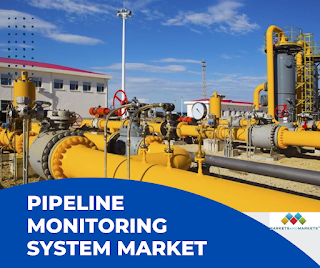Rising Demand for Pipeline Monitoring Systems in the Oil and Gas Industry
The Pipeline Monitoring System Industry refers to the market for devices, software, and services used to monitor and manage pipelines that transport liquids, gases, and other materials over long distances. This industry is primarily concerned with ensuring the safe and efficient operation of pipelines, minimizing the risk of leaks or other accidents, and optimizing pipeline performance.
The global pipeline monitoring system market size is projected to grow from USD 13.2 billion in 2021 to USD 19.2 billion by 2026, at a CAGR of 7.8% from 2021 to 2026.
Pipeline Monitoring Systems typically use a combination of sensors, communication systems, and data analysis tools to monitor pipeline conditions in real-time. They can detect changes in pressure, temperature, flow rate, and other factors that may indicate a problem, and can alert operators or automatically shut down the pipeline if necessary.
The use of Pipeline Monitoring Systems is critical in industries such as oil and gas, water treatment, and transportation, where pipelines play a crucial role in delivering essential materials and products. By continuously monitoring pipeline conditions, these systems can help prevent environmental damage, protect public safety, and ensure the reliable operation of infrastructure.
Request Sample Pages: https://www.marketsandmarkets.com/requestsampleNew.asp?id=138709351
Pipeline Monitoring System Market Key Players
The key players in the pipeline monitoring system market include:
- Siemens AG (US)
- Honeywell International Inc. (US)
- Huawei Technologies Co. Ltd. (China)
- BAE Systems (UK)
- TransCanada PipeLines Limited (Canada)
Pipeline Monitoring System Market Growth in APAC & North America Region
The Pipeline Monitoring System market is expected to grow significantly in both the Asia-Pacific (APAC) and North America regions in the coming years.
In North America, the market growth is driven by several factors such as increasing investments in pipeline infrastructure, growing demand for oil and gas, and rising concerns regarding pipeline safety and environmental protection. The United States and Canada are the major contributors to the Pipeline Monitoring System market in North America due to their large pipeline networks.
On the other hand, in the Asia-Pacific region, the market growth is primarily driven by the increasing demand for energy, infrastructure development, and the growth of the oil and gas industry. China, India, Japan, and Australia are the major countries contributing to the growth of the Pipeline Monitoring System market in the APAC region.
Additionally, the implementation of government regulations and initiatives related to pipeline safety and monitoring is also expected to drive the growth of the Pipeline Monitoring System market in both regions.
Overall, the Pipeline Monitoring System market in North America and the APAC region is expected to grow significantly due to the increasing demand for safe and efficient pipeline operations, rising investments in pipeline infrastructure, and the adoption of advanced technologies in pipeline monitoring and control systems.
Get PDF Brochure: https://www.marketsandmarkets.com/pdfdownloadNew.asp?id=138709351
In terms of value, the metallic pipes segment is estimated to lead the pipeline monitoring system market in 2020.
The metallic pipes segment accounted for the largest market share in the pipeline monitoring system market. Ductile iron pipes, stainless steel pipes, aluminum pipes, and other types, such as cast-iron pipes, corrugated pipes, and copper pipes, are considered under metallic pipes. Iron-based pipes may get corrosive when treated with highly oxygenated water steam; thus, metallic pipes made with steel have a higher demand from the end-user industries. Metallic pipes are also more conducive to heat and less corrosion-resistant than non-metallic pipes.
In terms of value, leak detection is estimated to be the fastest-growing segment in the pipeline monitoring system market.
The leak detection segment is expected to grow at the highest CAGR from 2021 to 2026. This could be attributed to the increasing focus on improving the control over pipeline infrastructure and automating the process to improve productivity, which would enable the monitoring of the conditions of assets and raise an alarm in case of unauthorized events. One of the major reason of leak detection application to grow includes, increase in investments from oil & gas companies in pipeline monitoring infrastructures and safe transportation of the material through it.



.png)
Comments
Post a Comment